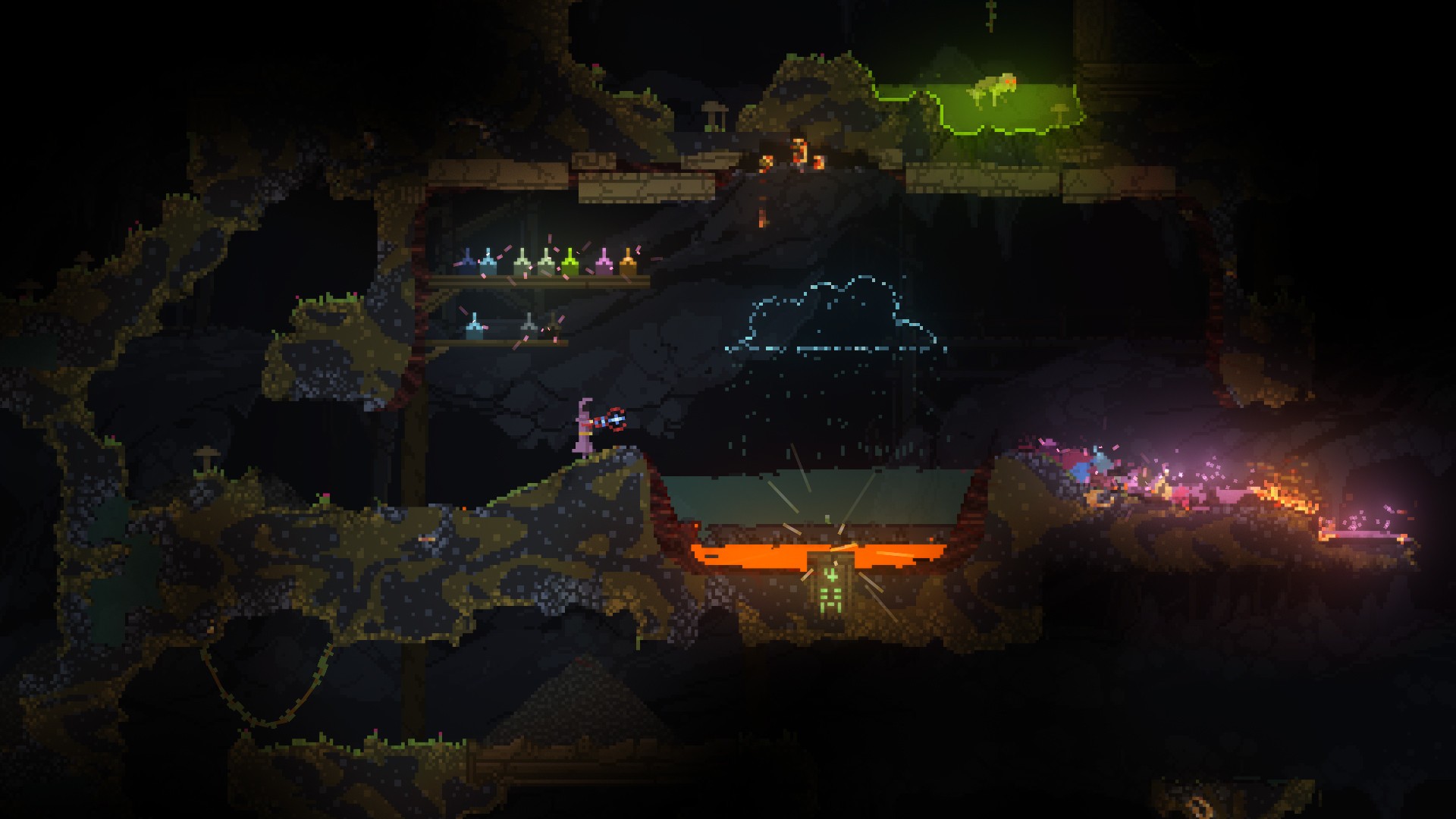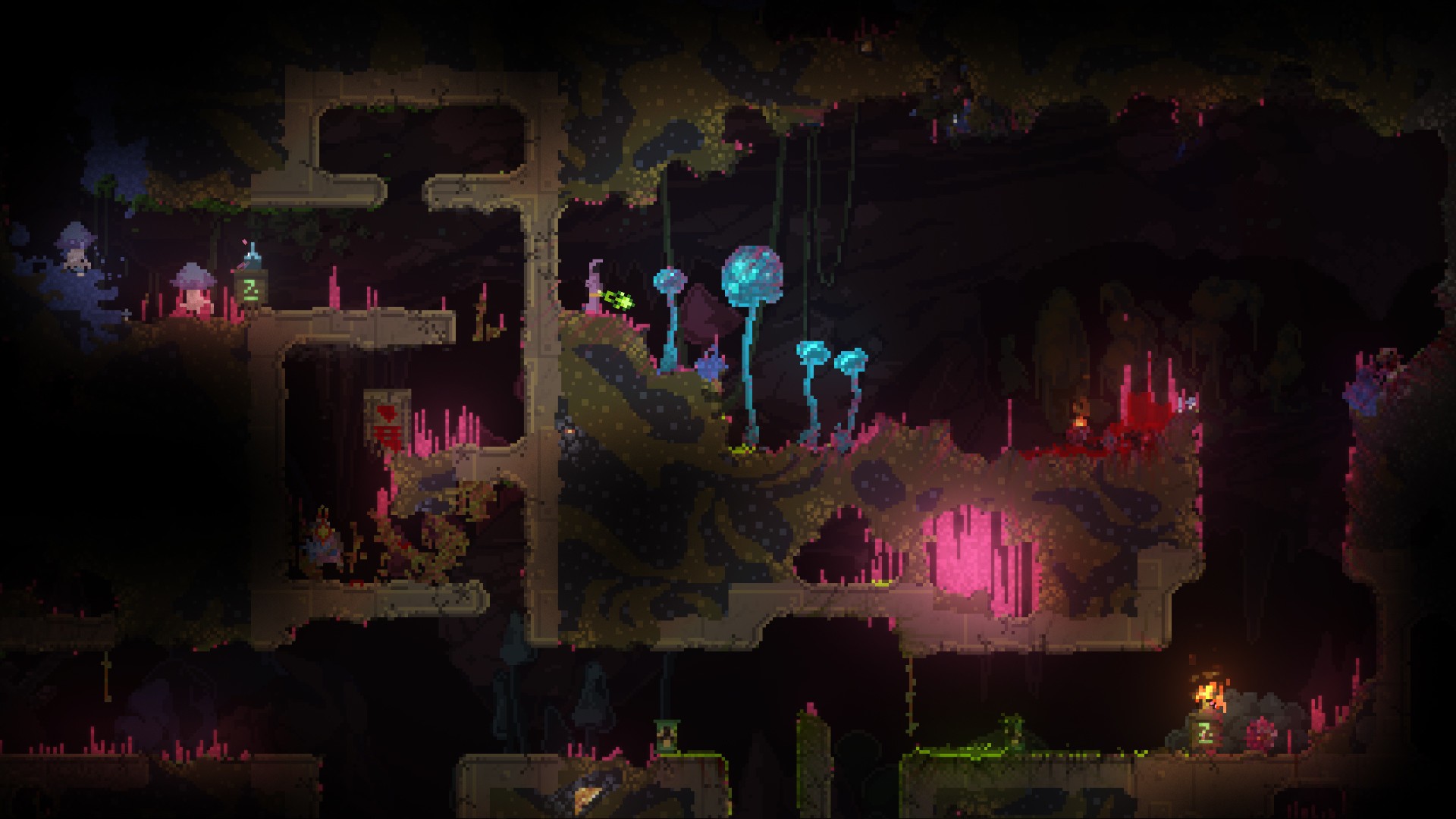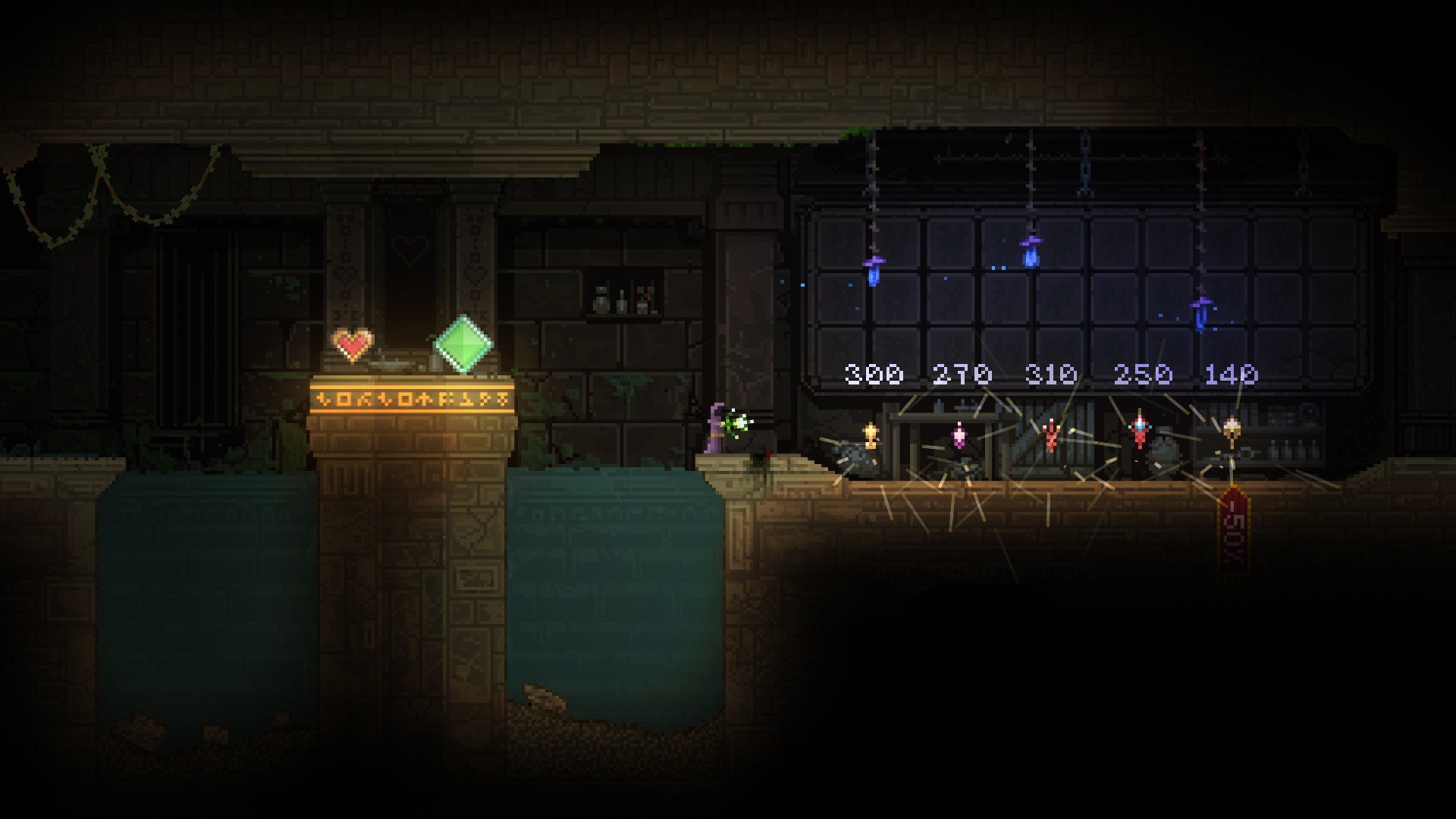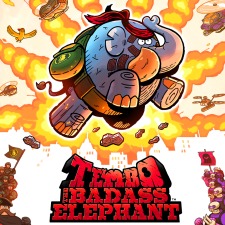
After releasing on Steam’s Early Access back in September of 2019, Noita has finally received its 1.0 update in the past 15th of October. The game studio, Nolla Games, is composed by three iconic indie devs who are best known for their previous titles, Crayon Physics Deluxe, The Swapper and Baba Is You. If you have never played any of these, I highly recommend you check them out, as they are probably quite unlike anything else that you might have played before. However, if you have played any of them or if you’ve at least heard about them, then I think you should already know what kind of quality you can expect from Noita.
To put it simply, Noita is an action dungeon crawler with permadeath where you play as a witch in a world where every pixel is physically simulated. Each new playthrough has you run through a new randomly generated world with a biome layout that remains consistent across different playthroughs. While you obviously won’t get the same exact experience as other players, with some tinkering, you can actually run any world seed that you want, but the game also features a daily run system, as well as an extra Nightmare mode that you unlock once you beat the game, if you fancy an even tougher challenge.
A lot of dungeon crawlers can be tough, but Noita is one of those that is actually brutal, and it is so in a way that the closest game to it that I can think of would probably be Spelunky. Despite being part of the same genre, these games don’t really share much in terms of key mechanics or the way they work, but the biggest similarity definitely comes from the fact that, in both games, the player can make use of the world around them and emergent gameplay opportunities to both fight off enemies as well as accidentally meet their own demise.
Thanks to the fact that every single pixel in Noita is physically and individually simulated, the possibilities are nearly endless. The fact that the environments are fully destructible with the right tool is only the tip of the iceberg due to the game being incredibly complex, as different liquids and elements can react with each other in multiple explosive and wondrous ways. For instance, water protects you from fire and conducts electricity, while oil makes you slippery and makes you prone to catch on fire. For some reason, you can also find tons of whiskey in the underworld which makes your camera wobble and blurry, but there’s also flammable gas and many other things that you can play with.
Alongside Noita’s pixel-based physics system, the other major feature of the game is the fact that you can customize wands by combining all sorts of different spells in any way you could possibly think of. Wands are your main weapons and tools in Noita, and they come in all shapes and sizes. Although you can find wands as you’re exploring, there are also a few of them that can be bought at the Holy Mountain, a safe zone at the start of each biome. Each wand has its own cast delay, recharge time, mana recharge speed, as well as its own mana pool that you use to cast spells and various other stats. However, a wand is only as interesting as you make it, because within each wand you can slot whatever spells you run across, and you can also change spells from one wand to another in any way you see fit. Sadly, generally speaking, you can only customize your wands within the Holy Mountain, which is quite a bummer.

At the moment, there are precisely 307 spells in the game, so you might be able to get a sense of how ridiculously complex Noita is. Spells range from simple ballistic projectiles to others that bounce off surfaces, from bombs to explosive firebolts, from black holes to teleportation, there’s all sorts of craziness going on. Also, while some spells can be used limitlessly, provided that you have enough mana, others only have a few uses per zone, and must be recharged at Holy Mountains. Speaking of which, besides going crazy with the game’s wand and spell customization, here you can also heal up back to full health as well as pick one out of three perks that are up for grabs. These perks can provide some really cool advantages such as extra gold per nugget or even elemental immunities and there are currently 75 of them, so it will probably be a while before you see everything that they have to offer.
While wands are a big part of the game, there are other items that you’ll run into that also create different gameplay opportunities and can potentially save you from death. Flasks are the most basic example, as you can fill these with any liquid and then either consume it or throw it. This can create scenarios where you can use the elements to your advantage, like throwing a flask of oil towards a group of enemies and then setting them on fire, or pouring water over you to extinguish a fire. The possibilities are countless.
The interactivity of Noita can be seen all the way from its first area right until the very end in multiple different ways. For example, you’ll immediately run into these wooden structures underground that allow you to completely change the landscape by using something small as an oil lantern to burn them. It’s actually quite mesmerizing to see fire consuming everything in its path, especially when you find out that it opened a way to a new chamber. It’s the small details of this intricate system that really add a lot to Noita as an experience. I’m just fascinated by the simplest of things, like when smoke rises and piles up in the ceiling due to a raging fire.
While I was initially floored by Noita’s absolutely gorgeous pixel art due to how each pixel can interact with everything around it, I quickly came to the realization that its sound design is equally astounding. In this case, I’m not particularly talking about how each spell and enemy sounds, but more so the actual background noises that you hear while you’re spelunking, like the eerie ambience sounds off the distance such as the wind gently blowing or strange creature noises.
The game always starts off on the surface, right outside the entrance of a massive cave system which you must explore, for whatever reason. As you proceed downwards you’ll eventually reach new areas and keep on finding new, exciting and deadly stuff. The world of Noita is inhabited by all sorts of crazy enemies such as tiny spiders, ghosts that throw acid projectiles at you, fiery skulls, worms, tanks, mages and various undead. The developers have certainly not spared any expense to come up with all kinds of foes to face players, as there are 129 different enemies that you can face off.

It’s worth noting that there is no hand holding whatsoever, you’re just thrown into the game without any sort of guidance. It’s up to each player to figure out how the game works through experimentation. While this might scare some people, personally I love when games do this, as it can both lead to Eureka! moments, as well as laughable and hilarious occasions where you royally mess up. That’s one of the strongest points of Noita for me. The fact that there isn’t any sort of progression besides the knowledge and experience that you accumulate as you pour more hours into the game. The game is extremely punishing for any mistakes that you make. For instance, surely you might want to pick up the gold nuggets that enemies drop when they die, however, if you’re not careful, you might find yourself getting caught on fire or dripping acid, as a lot of enemies release fluids when they die. It’s all a matter of risk versus reward.
Noita is undoubtedly one of the most challenging dungeon crawlers to release in recent years. In spite of that, the game can absolutely be played at whatever pace the player wants to. If you just want to rush it and try to complete the game as fast as you can, you can do that, but you can also take your time and spend hours exploring every single crevice of the world in a single run. That’s the beauty of Noita, there’s just so many ways that you can approach the core gameplay loop, and even more possible spell combinations with the various wands and spells that I honestly think I will never see everything that the game has to offer. There are also plenty of secrets in Noita, some of which you probably won’t run into even after spending hundreds of hours in the game, all because you have to know what you’re looking for and the only way you’re going to know what to look for is if you read about it somewhere or you check a guide.
Although all I’ve done so far has been nothing but praising the game, Noita does have a couple of problems. Besides the fact that I think that only being able to edit wands at the Holy Mountain by default is kind of a silly decision of a game that rewards experimentation, there’s also the issue with how random things can be. Due to the game’s inherent RNG, sometimes you’re probably better off just starting a new run instead of enduring the game’s difficulty spikes simply because you didn’t end up finding any wands or spells with enough DPS to face late-game enemies. In any case, thanks to the fact that the game supports mods and Steam’s Workshop, you can not only add new spells and perks, but you can also completely change the game by turning off things such as permadeath or allowing you to edit wands no matter where you are. I’m sure that given the time the community will come up with all sorts of shenanigans.
Just like I thought when I first saw Noita when it had just released in Steam’s Early Access, I’m sure that a lot of people might also think that the whole “every pixel is physically simulated” is just a shtick and that you will run out of things to see and do after a few hours, but that couldn’t be further from the truth. The spellcasting system is ridiculously in-depth and not only do things make sense, like water, protecting you from fire and all the other elemental synergies, but the game heavily rewards when you think outside the box. Sure, sometimes things might not work out, but I can assure you that there are a lot of stupid combinations that you might think that they won’t work because they just sound broken (like giving enemies, healing wands to heal you), but in reality, the developers have definitely put a lot of work and thought into the game and it clearly shows.
While I can recognize that Noita isn’t for everyone, I beg that if you decide to give it a chance, please give it a few tries until you get more accustomed with its intricacies. Personally, Noita has been a tremendous surprise and I honestly can’t recommend it enough. I just find that there’s something really ironic about the fact that pretty much everything that you can use against enemies can also most likely be used against you.
REVIEW CODE: A complimentary PC code was provided to Bonus Stage for this review. Please send all review code enquiries to press@4gn.co.uk.
Subscribe to our mailing list
Get the latest game reviews, news, features, and more straight to your inbox
Thank you for subscribing to Bonus Stage.
Something went wrong.
Noita Review
-
Gameplay - 10/10
10/10
-
Graphics - 8/10
8/10
-
Sound - 7/10
7/10
-
Replay Value - 9/10
9/10
User Review
( votes)Overall
Summary
Noita’s spellcasting system is ridiculously in-depth and rewards player experimentation, even though that could very well lead to your own death.





